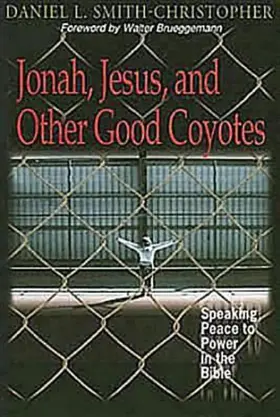

Jonah, Jesus, and Other Good Coyotes: Speaking Peace to Power in the Bible
An original, powerful, and programmatic reading of the Bible that emphasizes the biblical call to peacemaking
Smith-Christopher shows us that biblical peacemaking recognizes and then crosses―or “runs”―borders. All too often, borders and other imaginary lines drawn between groups of people have a way of becoming the basis for conflict, bigotry, and ultimately, war. Danger signs are evident when people use “borders” to talk about the goodness of everyone within “our” border, and the evil of everyone “over there.” Modern social commentators use the phrase “the other” to refer to the tendency of human groups to develop a positive image of themselves by contrasting it with negative images of others.
Smith-Christopher states that when this happens, it is important for us to remind ourselves that it is a profoundly biblical lesson that making peace between groups of people often requires that somebody must be willing to intentionally cross the “borders” that separate groups. In this book, he argues that the Bible teaches Christians that they are this somebody. Crossing boundaries is a biblical mandate, and the foundation of peacemaking.
About the title: “Coyote” in modern parlance refers to human traffickers of illegal aliens and immigrants. Coyote crossings commonly elicit the image of professional mercenary smugglers who prey upon the hopes and dreams of illegal aliens. However, among immigrants themselves, the overwhelming view of Coyotes is positive. Daniel Smith-Christopher uses this paradox, this provocative image, a very biblical paradox, he adds, as the central and effective metaphor in the book. Jonah and Jesus are reviled for the same reason, he says: they crossed boundaries, they met the “other,” and they brought them over. They thumbed their noses at man-made and fear-based boundaries that exclude rather than embrace.
